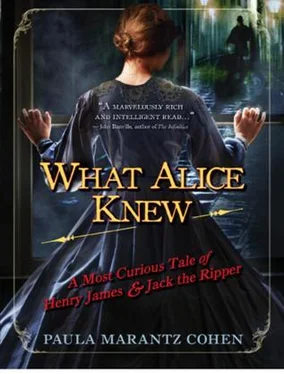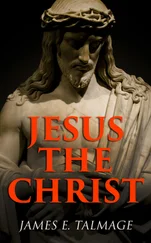Whatever was behind it, he felt he was being pulled off the hinges of his conventional life by the sight of her. He could feel himself swerving and careening, and he clutched at something practical. “I asked you to come,” he said, trying to keep his voice level and calm, “because I wanted to know more about that…man…to whom you gave the volumes. Walter Sickert. You said you misjudged his character. What did you mean?”
Ella looked surprised. “Didn’t you meet with him?”
“Oh yes,” said William. “He is painting my sister.”
He must have registered distaste in saying this, because she smiled wryly. “And you disapprove?”
“I didn’t say that,” said William defensively. “She has commissioned him to do her portrait. I was simply curious about your comment regarding his character, since he visits her house now every day.”
“I think if he is painting your sister, you know what my comment means,” said Ella. “He only paints women he admires. I’m sure your sister enjoys his admiration. Of course, she must be prepared to share it.”
“My sister has no interest that way,” said William sharply. “She is an invalid, and he is a married man.” He spoke, realizing that he himself was a married man, though he was sitting with a strange woman in a public house in Whitechapel.
“Yes, he is married. I didn’t mean sharing him with his wife.”
“You mean that his immorality goes beyond simple adultery?”
“Simple adultery, as opposed to complex adultery?” said Ella with amusement. “Yes, I suppose that is what I mean.”
“In other words, there are other women,” William said pointedly and then paused. “And that’s all?”
“All what?”
“All you meant when you said you misjudged his character.”
“I should think that would be enough.”
William nodded. She knew no more, then, than that Sickert was a philanderer of the worst sort. It was not what he had been looking for, and yet why did he need more to convince him that the man was a degenerate and, by extension, a murderer. He cleared his throat nervously. There was no point talking about Sickert any longer. “I hope you don’t feel I’ve wasted your time.”
“No.” She smiled. “I don’t see how you can waste something in such plentiful supply. I am flattered that you would want to see me again. I certainly wanted to see you.”
He felt himself flush but hurried to disguise his pleasure. “It’s good you had an errand to do,” he said lamely.
Ella shrugged. “There are always errands for me to do.”
“Tell me about them.” He wanted to know more about her life.
“Oh, business for the shop. And chores for the household.” She paused. “I must make visits and receive them. My mother wants me to get married.”
“And is that what you want?”
She shrugged again. “It would be a change.”
William laughed. It was odd to think of marriage as the means to “a change,” but in a sense, that was what it was. Marriage allowed the sameness of one’s original family to be opened up, to detour from its static, familiar course.
“I should like to have children,” she mused. “There might be satisfaction in being a mother. But for that, I must find someone to marry. And so far, I have found no one suitable.”
“And whom do you consider suitable?”
“Oh, he must be Jewish and rich, and I suppose moderately attractive and interesting to talk to.”
“That’s a rather exacting set of requirements.”
“I’m sure your wife conforms to an exacting set of requirements,” she said drily.
William acknowledged to himself that she did. His Alice shared his religion and his interests and had been fully approved by his parents.
There was silence between them for a moment. He could think of nothing to say, and part of him did not feel inclined to talk. For some reason, the feeling of nervousness and discomfort he had felt when she arrived had disappeared. He sat looking at her, and she looked back without embarrassment. She then laid her arm on the table, the palm open.
It was odd how a simple gesture—an arm on a table, an open hand—meaningless in other contexts, could be so eloquent. He looked at the hand in its roundness and softness, the long fingers with the smooth nails, which had been filed so that they tapered into little white moons showing above the rosy, darker flesh. It was a hand not so different from other hands, and yet infinitely different. And it had been placed on the table expressly for him.
He gazed at it. The attraction he felt for her was intense; it was as though he were underwater, breathing through a filter. His senses felt muffled but also preternaturally alert, attuned to the presence across from him. He took his hand from his lap and placed it on her hand, his fingers intertwining with hers. It was as though he had caught a small animal that might jump away if he did not hold it tightly. Every nerve in his body was vibrating with life, his mind in a kind of frenzy of excitement and desire as he felt her pulse drumming under his fingers. He clasped her hand more tightly, and it remained still under his.
The rest was a kind of dream. A wizened little barmaid showed them upstairs without the trace of a question and opened the door to a room. It was almost bare except for a bed and a night table, but cleanly swept. Ella placed her cloak on the end of the bedstead and stood before him. He put his hand out, touched her cheek, and then let it fall to the button at the top of her dress. It was a simple dress with buttons leading from the top of the neck to the waist, where there was a wide embroidered sash. He imagined that he would unbutton each of the buttons to the waist and then, in a great sweep of his hand, pull the sash so that the whole edifice that encased her would open up suddenly, and she would be released into his arms. It was just the sort of dress he would have imagined for her—sleek and unadorned, yet intricate with its buttons from neck to waist. Everything about her was simple and strange that way—contained and quiet but also dramatic, intense, excessive.
His fingers touched the top button of her dress. A button, he thought, was itself simple but strange, a mere twist and it was undone, yet it held through all sorts of buffeting. Human skin was like that too, the way it covered the body in an unbroken casement, so solid and yet so susceptible to harm, so protective and enduring, except in cases where it was penetrated, and then there was nothing one could do. He had a sudden mental image of the photograph of Catherine Eddowes, her body opened up in a thicket of carved flesh. But the image was engulfed with the image before him: disgust eclipsed by desire.
He looked down at Ella, whose face was flushed but who registered no sense of shame. She was looking at him, and he knew that she felt the same intense desire that he felt. His hand moved, twisting the button free of the cloth. He placed his hand on the flesh of her neck, feeling the heat of her throat pulsing beneath it. She moved closer to him, her body nestling into his. He smelled the London damp on her dress mixed with the odor of her strangeness. How astonishing it was to be entangled with another body to whom one had no past, no formal relation. And yet the wonder was also that for all the strangeness of her—the difference in nationality, religion, experience of people and events—she had come to him here as he had come to her. Hadn’t it seemed from the first moment they saw each other that they were destined to embrace? So much of life was unsynchronized, where one person desired more, and the other, less. Could it be wrong to feel such mutual desire? Could it be anything but good to desire alike, so different from the case of the murderer, that incarnation of evil? For what was murder but the denial of reciprocal feeling, the imposition of one will at the expense of another’s life? He and Ella were that miracle of mutually desiring beings in the midst of a universe that was too often unbalanced, unruly, and cruel.
Читать дальше












